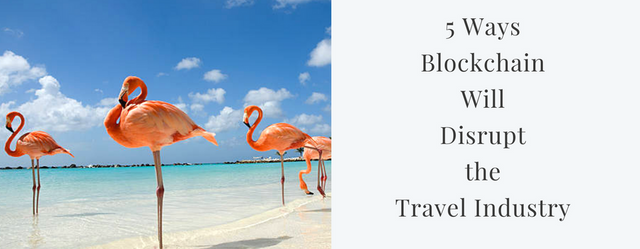
There has been huge interest from global financial services companies and supply chain organisations in the potential benefits of blockchain. However the travel industry has also been looking at what benefits blockchain can offer them. Here are 5 areas where blockchain technology could provide benefits and cost savings.
Data:
The world’s biggest tourism company, TUI, announced that it plans to move all its data on to the blockchain. It would use blockchain technology to track internal contracts and launched an application- BedSwap- to maintain real-time records of hotel inventories. It could move its hotel inventory to different points of sale depending on the demand, adjusting selling margins accordingly.
Destinations:
The government of Aruba is working with startup Winding Tree to connect tourists directly with travel suppliers on an ethereum based platform. Cutting out the ‘middle men’ would mean that destinations could keep more revenues in the local economy. The management of the ‘customer experience’ is becoming a major focus for destinations, tracking the visitor’s experience at all touch points and, where necessary, streamlining processes to improve the customer journey. Blockchain allied to AI could be a major play in this.Smart Dubai is a government backed strategy to make the country a global capital of blockchain technology. It is working with Loyyal on how it can incentivise visitor behaviour by ‘gamifying’ their visit, helping them discover new places and rewarding them with loyalty points.
Identity:
One of the potential uses of blockchain technology is to provide a digital ‘identity’ for individuals. In one transaction you could book your ticket, clear customs, and have your loyalty points added to one central loyalty points ‘bank’ that could, for example, pay for your taxi on arrival at your destination.
Payment Settlement:
Initially this is probably the ‘killer process’ that the travel industry will use blockchain for. Blockchain’s offering of a single, secure, transparent global ledger, could drastically reduce costs for airlines, hotels and travel agencies by streamlining bank payments and settlements.
Vacation Rentals:
The global vacation rental/ short term let market is estimated at $500 billion and growing 10% annually. Airbnb has disrupted this market and gained market share of about 7%. However, Airbnb is a middleman and could itself be disrupted by a new blockchain startup. One example is Beenest, a home sharing platform, that rewards users with token based network incentives and commission-free transactions. A crowdsourced verification and rating system would provide a user quality score.
Conclusion:
The travel industry is notably disjointed, with governments, travel agencies and credit card companies running differing legacy systems, all of which would have to be migrated to the blockchain. Blockchain presents data security and privacy implications that would need to be addressed.
Some of the current ‘big player’ moves into blockchain are really little more than a sop to the markets to be seen to be ‘doing something’ with blockchain. Some of the startups could be massively disruptive. Time will tell.
However, digital disruption is a reality in today’s world. Any orginization that ignores, what could be a revolutionary technology like blockchain, may end up in the same graveyard as those companies that did not adapt quickly enough to previous digital disruptions.
About the author: Paul Henderson has set up profitable digital travel businesses around the world. He is founder of Blockheads.co, a content strategy consultancy for blockchain startups.
Congratulations @jerseypaul! You have completed some achievement on Steemit and have been rewarded with new badge(s) :
Click on any badge to view your own Board of Honor on SteemitBoard.
For more information about SteemitBoard, click here
If you no longer want to receive notifications, reply to this comment with the word
STOPDownvoting a post can decrease pending rewards and make it less visible. Common reasons:
Submit